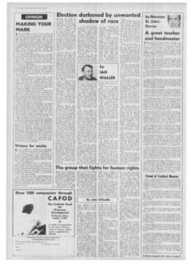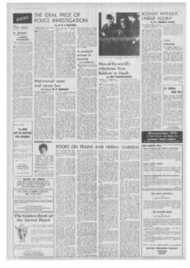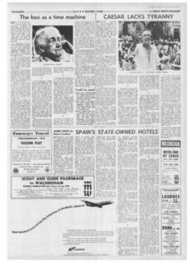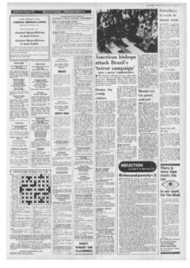Page 4, 12th June 1970
Page 4

Report an error
Noticed an error on this page?If you've noticed an error in this article please click here to report it.
Tags
Share
Related articles
Applause And Shadows For Mr. Heath - By Ian
Obsessed By New Black Magic
Undercurrents At Tory Conference
Dangerous Writing On Powellism By Ian Waller
Conservatism Of Mr. Wilson Waller
Election darkened by unwanted shadow of race
by IAN WALLER
4-1 TNT1L this week Mr.
Heath has handled his daily press conferences. immaculately; not very iespiringly. perhaps. but carefully controlled, lightened with occasional unexpected shafts of wit, and refusing to be pros oked into any incautious off-the-cuff-remarks.
But on Monday there were the first signs of irritability and bad temper; the selfconfidence looked as though it might be cracking under the devastating shock of a week in which the opinion polls. for all their earlier seesawing, were unanimous in forecasting a Labour victory.
It was hard at that moment not to have some sympathy for Mr. Heath; he has, like Mr. • Wilson, assumed very personal control of the direction of the campaign; he knew that he was entering the crucial make or break week; and he must he acutely aware that a further Tory defeat marks the end of his political career. Rightly or wrongly one man alone will be blarned in the feuding that will break out in the Tory Party if Mr. Wilson gets back to Downing Street next Thursday.
It is. of course, true that electoral fortunes have changed dramatically in the final days of past campaigns —1959 was a case in point when Gaitskell's formidable lead at the outset simply disintegrated before our eyes. But it is rare for a Government to suffer that— it is the Opposition that have to convince of the need for change and. short of a miracle in the next few days, cannot see it happening now.
Indeed. barring that miracle, Mr. Heath's problem up to polling day may well be not how to win but how to avoid a rout. Conservative morale has suffered a very profound shock over the way the campaign has gone and nothing erodes the strength of a political party more than defeatism — and defeatism is all I have heard from candidates and party workers these last few, days.
If shock had seemed to make Mr. Heath irritable in the morning it also clearly galvanised him for by the time he got to his meeting in Exeter that evening he was in a different mood. Gone was the cold off-hand manner that had caused so much adverse comment in the earlier part of his tour. He does not find it as easy as Mr. Wilson to establish rapport with strangers or to be spontaneous. But he clearly decided that. with his back to the wall, he had to throw off his inhibitions — and it produced a reaction both from the crowds and the audience that probably surprised and certainly heartened him. At their Council of War meeting in his Albany flat on Sunday — and it must have been a pretty sombre affair — Mr. Heath and his colleagues decided to continue their basic strategy: to assault the Government over the cost of living and to highlight the economic crisis they believe to be imminent. By slogging away at these themes. and pinpointing Mr. Wilson's personal responsibility for it, they remain convinced they can still shatter • confidence in the Government.
At that stage, half way through the campaien, they probably had little alternative but to continue with the same strategy even though it las shown almost no sign of catching on. Indeed, in a sense it has highlighted what I have always regarded as the fundamental defect in the Conservative campaign —the failure to clarify precisely what Conservative policies are and how, above all (and something we arc going to hear a good deal about in the final days of the campaign from Mr. Wilson) they are going to honour their pledge to cut direct taxation and abolish SET.
The same applies to attacks on rising prices and forecasts of economic doom. Prices are an irritant and economic rocks may lie ahead (although much independent economic opinion takes a more sanguine view than Lord Cromer who seems to fill the Times alm)st daily now with a talc of woe) but it is a basic rule of political warfare that if you focus attention on a problem you should also give some idea of what you are going to do about it. And that Mr. Heath has signally failed to do. The result is that the campaign up to now seems merely negative and carping.
One of the joys of electioneering for the political observer is guessing who will drop the first brick. So far George Brown has been remarkably discreet although those who have studied George over the years remain confident that emotion will get the better of him as the campaign nears its climax; and we are. alas. now deprived of thc inimicable contributions that RAB Butler used to delight us with. But Richard Crossman and Anthony Wedgwood Be n n are not doing too badly.
Mr. Crossman's dealings with the medical profession appear to have been mishandled on a scale that only an intellectual genius of his proportions could have achieved. Did he tell them the pay award was being partially deferred because the nation faced "grave economic peril"? The reply which again only Crossman could have produced. deserves to be preserved for posterity "The doctors have said I said it but I did not.
Even if I did say it I withdraw it."
And it was this remark about "grave economic peril," be it said or unsaid, that came like manna from heaven to buttress up the Conservative warnings of crisis ahead. Mr. Crossman once observed, with his characteristic and engaging candour: "I think I am Labour's biggest vote loser."
Mr. Wilson, I suspect, echoes his words on the narrower point of whether half the doctors' very substantial award should be deferred for a fresh look by the PIB. There does not seem to me to be much mileage in it for the Opposition although Mr. Heath has tried hard.
It is not easy to stir up popular feeling for people whose complaint is that they are only getting E20 a week extra (with almost certainly more to come); nor arc the G.P.s doing much for. their own reputation by threatening political blackmail in an election. What would be said of an industrial trade union that tried it on?
Mr. Benn's gaffe was rather different—his attack on Enoch Powell. It was the extravagance of his language rather than the target that was unwise and had the unfortunate effect of focusing attention of Mr. Henn rather than Mr. Powell; indeed, to read some of the abuse that has been heaped on Berm since, one could forget that the real source of the trouble, the real fanner of racial tension, is Enoch Mr. Wilson was as displeased as Mr. Heath by Benn's speech—both leaders quite genuinely want to keep race out of the election; apart from the Obvious dangers to future race relations, Mr. Heath has no desire to get lumbered with the responsibility of Powellism and Mr. Wilson cannot be blind to the fact that Powellism has an appeal to some of the working class Labour vote.
Powell and Powellism is a fact of life. but I believe that the manifestations of Powellism are very evil. It is certainly an underlying element in this election because of the following he has among a section of the Conservative Party and because of the influence that he will have within the party after the election whether they win or lose.
He may not have mentioned race much in the campaign (indeed Powell with his extraordinary capacity for hair-splitting equivocation says he does not know what race or racialism is; it is immigration he is talking about).
But the fact is that he is the focal point of racial tension and that his election address advocates a course —the total ban on all further immigation including even the dependants of those already here—that is not only unChristian but would provoke the very tensions he claims to be warning us against. Mr. Beim may have been rash in his choice of words but 1 cannot believe he was wrong to focus attention on the issue of Powellism.
Mr. Heath's attitude to Powell and all he stands for has been perfectly honourable — he abhors it as he showed when he dismissed Powell from the Shadow Cabinet. But he resolutely refuses to dissociate himself and the party from Powell and what he proposes in his election address as the official Conservative for Wolverhampton, South west —just as the party leadership refused to do in 1964 with Mr. Griffiths at Smethwick.
Mr. Griffiths won that election on a recipe of race hatred but it exposed his party to the charge of being willing to pick up votes anywhere. One can appreciate Mr. Heath's predicament but in jumping so eagerly to the defence of Mr. Powell and refusing to repudiate his policy he could expose himself, to the same charge.
Mr. Heath should not forget he needs the support of liberal opinion as much as he needs his fanatical Right wing. And, as I said last week. Mr. Powell frightens a lot of people.
blog comments powered by Disqus











